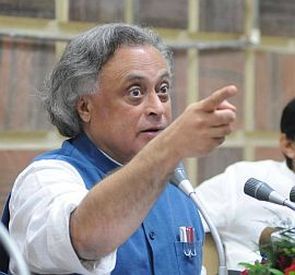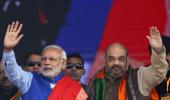 Senior Congress leader Jairam Ramesh has moved the Supreme Court challenging the decision to treat Aadhaar Bill as a money bill, which was passed during Budget session last month, overruling amendments moved in Rajya Sabha.
Senior Congress leader Jairam Ramesh has moved the Supreme Court challenging the decision to treat Aadhaar Bill as a money bill, which was passed during Budget session last month, overruling amendments moved in Rajya Sabha.
"Yesterday I have filed a writ petition in the Supreme Court challenging the decision to treat Aadhaar as a money bill," Ramesh, a former Union minister during United Progressive Alliance, said in New Delhi.
With this, the controversy over treating Aadhaar as a money bill, which refuses to die down ever since its passage, has taken a new twist as it is generally believed that Speaker's discretion is final in the matter.
Accusing the Bharatiya Janata Party-led National Democratic Alliance government of showing "utter contempt" of Rajya Sabha for taking the money bill route to pass the Aadhaar Bill, the oppositon party had earlier indicated that the matter could be challenged in the court.
Rejecting Rajya Sabha's five amendments and opposition's appeal not to make "haste", the Lok Sabha had on March 16 passed the Aadhaar bill that aims at better targeting of subsidies through the Aadhar unique identity.
Shortly before it was adjourned for more than a month-long recess for scrutiny of budget, the Lok Sabha had adopted the Aadhaar (Targeted Delivery of Financial and other subsidies, benefits and services) Bill, 2016, by a voice vote after rejecting the recommendations for five amendments made by the Upper House earlier in the evening.
Armed with the Speaker's decision that it was a money bill, the government pushed it in the Rajya Sabha, which cannot amend it but only make recommendations for amendment to the Lok Sabha.
Once the Lok Sabha passes a money bill with or without amendments recommended by the Rajya Sabha, it is deemed to have been passed by both the Houses.
Showing urgency in getting the law through, the government, which enjoys a comfortable majority in the Lok Sabha, had brought the measure to the lower house within an hour of being returned by the Rajya Sabha.
Finance Minister Arun Jaitley, who moved the bill and piloted them in both the Houses, had also turned down opposition argument that Parliament cannot legislate since the matter is before Supreme Court.
Parliament cannot abdicate its duty under the Constitution which clearly separates powers among various institutions, he had said.
Congress leader Jairam Ramesh while proposing amendments in the bill in Rajya Sabha, had then expressed "anguish" that the Bill was brought as a money bill, an act he likened to "knocking a nail in the coffin of the Upper House".
Ramesh had said that Jaitley, in his attempt to justify the decision to treat Aadhaar as money bill, had "misled" the House by claiming that in the past two Bills, one on Juvenile Justice and another on African Development Bank, too had beenbrought as money bills.
Jaitley then told the House that his source was Lok Sabha website itself.
Calling the passage of the bill in this manner "a very dangerous trend", Ramesh had later said that the government tried to "bypass" the Rajya Sabha by doing this.
Insisting that a series of conditions are specified in Article 110 and that Article 110 uses the word "only" if those conditions are prevalent can a bill be declared a money bill, Ramesh had said that the Aadhaar Bill, which was passed as a money bill "ignored five recommendations made by the Rajya Sabha.
"It had many other provisions and most constitutional experts have given the view that the Aadhaar Bill is not a money bill. While the prerogative of declaring a bill as a money bill or not is that of the Speaker and the Speaker's decision is final but the recommendation to the Speaker to consider making it a money bill is that of the Government.
"It is the government that decides whether it is a money bill or not and the Speaker only certifies it as money bill," he had argued, drawing strong comments from the BJP.
Moving amendments in the Upper House during the consideration of the bill, the former Union Minister had argued that every individual should have the freedom to opt out of Aadhaar and said the present Bill does not give that space.
Stating that he himself does not have an Aadhaar card, Ramesh said a situation may arise when it may be needed even to book a flight or get a phone number.
He also opposed another provision in the Bill which he termed as "broad" and "amorphous" and could become the ground for misuse of the law as it gives "sweeping powers" on the grounds of national security.
He suggested that rather than national security, the terms "public emergency" or "public safety" could be used. He suggested that an independent member like the CVC should be included in the panel that decides which information regarding a person can be shared.
Ramesh said any suo motu powers, "even to collect information" should not be given to the Aadhaar authority, for instance it could even direct collection of DNA.
He said there were concerns of privacy and the amendments moved by him were in line with the recommendation suggested by a Commission headed by Justice (retd) A P Shah, which had been set by the Planning Commission to examine the matter.










 © 2025
© 2025